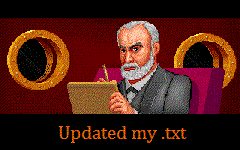RPGamer interview, if it hasn't been posted yet:
https://www.rpgamer.com/features/2017/interviews/chrisavelloneint2017.html
Here's a snip:
JS: I have read in interviews that it seems one of the reasons you left Obsidian was due to creative differences you had with management. First, is that correct? And if so, has going freelance helped to allowed you the creative freedom you desired?
CA: No, the departure was largely due to organizational and management aspects – not anything to do with the developers and folks who worked on the games. And please don't think this is somehow implying I'm a great manager, I'm not. I don't read tons of management books, I don't hang around with agents and business development reps, and I often feel lost around managers and CEOs because I don’t understand a lot of the jargon. In general, my management approach is more about establishing hierarchy, setting expectations, trusting people with the proper title and roles, giving consistent feedback (esp. positive feedback – which is more important when it isn't accompanied by negative feedback), don't play favorites or hire family/friends, and recognizing that if one doesn't have enough money and one doesn't have enough time to make a good game, figure out (1) how it got to that point so you don't repeat it, and (2) what can be done right now to fix both for the sake of a project – even if it means personal sacrifice of time, and your own funds to make a good game.
People has pointed out humble attitude, but for me the most striking thing is honesty. There were several quite politely formatted comments posted regarding crunch culture in industry. The thing is, nobody is calling out that it happens because someone fucked up. When it keeps happening again and again, it means somebody isn't neither learning or getting the memo.
In military situations where squad held bridge against overwhelming odds when enemy tried to take it with company of troops, those soldiers in a squad are applauded as heroes, maybe even decorated. But among officers, the most important discussion is, how did this situation, weakness happened to begin with? Who, how, when? What can be learned from this not to be in this position again?
What I read Avellone's leading style, I think wonder if he considers his management skills not to be that great because he realises, that even with good team it great feature, as a strength, it's situational (he even admits he's not up with the jargon.)
Anyway, Avellone sounds like a guy who may call out this sort of bullshit just because he is that sort of guy and for second reason, he probably likes to work with people whom brains are fit and crunch culture is counter productive to that sort of leadership.

























![The Year of Incline [2014] Codex 2014](/forums/smiles/campaign_tags/campaign_incline2014.png)

![Glory to Codexia! [2012] Codex 2012](/forums/smiles/campaign_tags/campaign_slushfund2012.png)




